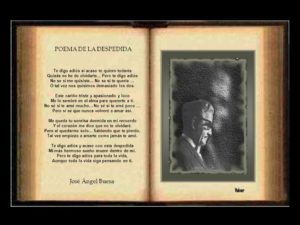José Ángel Buesa fue un poeta romántico con un claro tono de melancolía a través de toda su obra poética, que es primordialmente elegíaca. Se le ha llamado el “poeta enamorado”. Ha sido considerado como el más popular de los poetas en la Cuba de su época.
Buesa nació el 2 de septiembre de 1910 en Cruces, cerca de Cienfuegos, Cuba. A los 7 años empezó a escribir sus primeros versos. La gente, los cañaverales, y todo el medio de Cienfuegos, ejerce un embrujo en el alma del poeta, que empezó a plasmar en sus versos la magia del paisaje que lo rodea. Aún joven, se trasladó a La Habana, donde se incorporó a los grupos literarios existentes y comenzó a publicar sus versos a los 22 años (1932) con gran éxito.
https://youtu.be/XuqMX7rHvgs
Sus libros se agotaban tan pronto salían. Se dice que de un poema suyo fueron los primeros versos que se oyeron en la televisión cubana en el año 1961. Catalogado por algunos críticos como poeta menor, cursi y fácil, no obstante podría afirmarse que ningún poeta cubano ha hecho mejor gala del neo-romanticismo americano.
Tras una primera etapa muy productiva, Buesa se vio obligado a abandonar Cuba para empezar una penosa peregrinación por España, Islas Canarias, El Salvador y finalmente Santo Domingo. Los últimos años de su vida los vivió en el exilio, y se dedicó a la enseñanza, ejerciendo como catedrático de literatura en la Universidad Nacional Pedro Henríquez Ureña en la República Dominicana, donde murió el 14 de agosto de 1982. Aparentemente estuvo enterrado en Santo Domingo durante unos años, pero un grupo de fanáticos de sus poemas de Puerto Rico consiguieron, con la anuencia de su viuda, que sus restos fueran llevados a Miami, donde ahora descansan.
Obras
Sus principales obras son: La fuga de las horas (1932), Misas paganas (1933), Babel (1936), Canto final (1936), Oasis, Hyacinthus, Prometeo, La vejez de Don Juan, Odas por la victoria y Muerte diaria (todas publicadas en 1943), Cantos de Proteo (1944), Lamentaciones de Proteo, Canciones de Adán (ambas de 1947), Poemas en la arena, Alegría de Proteo (ambas de 1948), Nuevo oasis, Poeta enamorado (ambas de 1949) y Poemas prohibidos (1959). Su libro Oasis (1943) se reeditó en más de 26 ocasiones, así como Nuevo Oasis.
Algunas antologías de sus poemas son: Doble antología (1952) y Los mejores poemas (1960). Póstumamente se han editado las antologías Pasarás por mi vida (1997) y Nada llega tarde (2001).
José Ángel Buesa was a romantic poet with a clear tone of melancholy through all his poetic work, which is primarily elegiac. He has been called the “enamored poet”. He has been considered the most popular of the poets in Cuba of his time.
Buesa was born on September 2, 1910 in Cruces, near Cienfuegos, Cuba. At age 7 he began to write his first verses. The people, the cane fields, and the entire middle of Cienfuegos, exerts a spell on the soul of the poet, who began to capture in his verses the magic of the landscape that surrounds him. Still young, it moved to Havana, where it was gotten up to the existing literary groups and began to publish its verses to the 22 years (1932) with great success.
His books ran out as soon as they came out. It is said that his poems were the first verses that were heard on Cuban television in 1961. Cataloged by some critics as a minor, cheesy and easy poet, it could nevertheless be said that no Cuban poet has made a better show of the neo- American romanticism.
After a very productive first stage, Buesa was forced to leave Cuba to begin a painful pilgrimage through Spain, the Canary Islands, El Salvador and finally Santo Domingo. The last years of his life he lived in exile, and he devoted himself to teaching, practicing as a professor of literature at the National University Pedro Henríquez Ureña in the Dominican Republic, where he died on August 14, 1982. He was apparently buried in Santo Domingo for a few years, but a group of fans of his poems from Puerto Rico got, with the consent of his widow, that their remains were taken to Miami, where they now rest.
Works
His main works are: The flight of the hours (1932), pagan Masses (1933), Babel (1936), final song (1936), Oasis, Hyacinthus, Prometheus, The old age of Don Juan, Odes for victory and daily death (all published in 1943), Songs of Proteus (1944), Lamentations of Proteus, Songs of Adam (both of 1947), Poems in the sand, Joy of Proteus (both of 1948), New oasis, Poet in love (both of 1949 ) and Prohibited Poems (1959). His book Oasis (1943) was reissued more than 26 times, as well as New Oasis.
Some anthologies of his poems are: Double anthology (1952) and The best poems (1960). Posthumously, the anthologies You Will Pass Through My Life (1997) and Nothing Becomes Late (2001) have been edited.
Agencies/Wiki/Various/Internet Photos/ YouTube/ Arnoldo Varona/ TheCubanhistory.com
THE CUBAN HISTORY, HOLLYWOOD.







